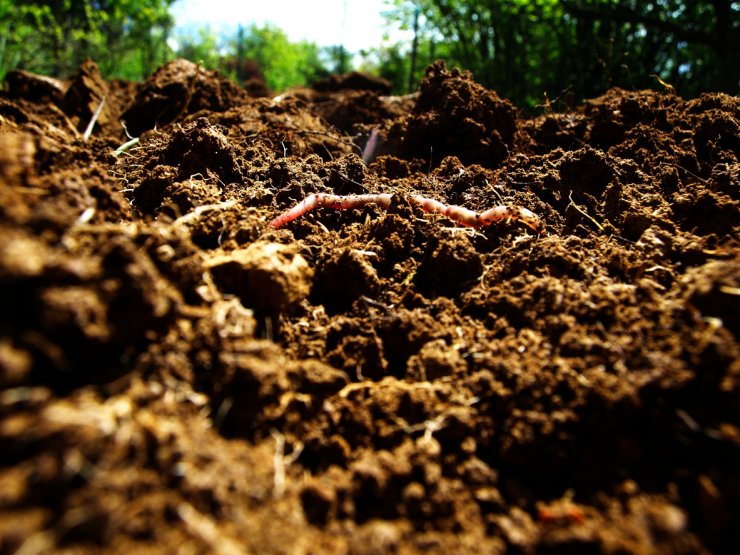
Let’s just get this out of the way: Worm Castings = Worm Poop. But, “castings” is a much more civilized way of describing the digested waste of your garden variety earthworm so we’ll just stick with that!
Worm castings, not unlike animal manure, provide rich nutrients and healthy bacteria for plants and vegetation and can be the secret superfood to help your indoor plants thrive. Here are five benefits of worm castings for indoor plants and how to buy or make your own worm composter.
Discover 7 top tips for growing, harvesting, and enjoying tomatoes from your home garden—when you access the FREE guide The Best Way to Grow Tomatoes, right now!
Nutrient-Rich Plant Food
Worm castings contain a mixture of bacteria, enzymes, remnants of plant matter, and broken down animal manure (and other existing compost). These castings are chock-full of plant nutrients and have over 50% more humus (broken down leaves and plant matter) than regular topsoil. Castings also contain plant-essential minerals like nitrates, magnesium, phosphorus, calcium, and potassium. They also contain manganese, copper, cobalt, borax, zinc, iron, nitrogen, and carbon.
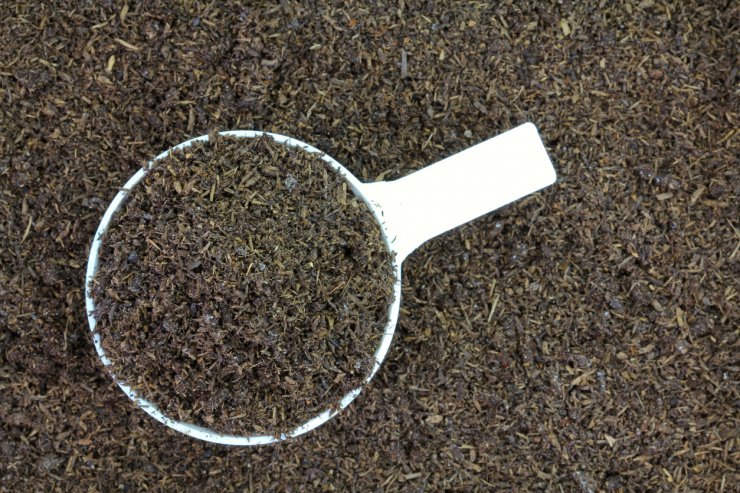
Safer Than Chemical Fertilizer and Animal Manure
Worm castings are ready to be used as soon as the worm, well… you know… does its business. Best of all, castings won’t burn plants due to too much nitrogen like other chemical fertilizers or animal manure. Worm castings do contain about 5% more nitrogen than regular garden soil, but it’s in a slow-release form. The castings are covered by mucus that the worm secretes as they digest which causes the nitrogen to release slowly. (I know, I know, gross but cool.)
The key takeaway here is that you can’t over-fertilize your indoor plants by using too many worm castings, which makes it a foolproof way for your plants to thrive.
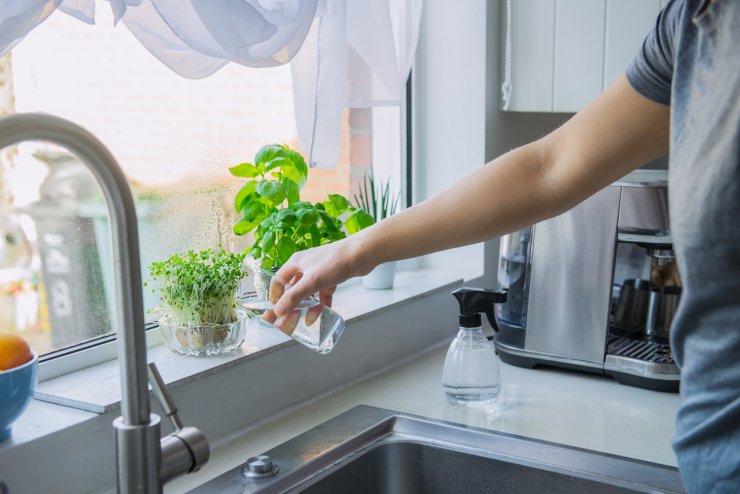
Enhanced Water Retention
The texture of worm castings mixed with soil helps the indoor plant hold moisture. Castings form mineral clusters that withstand water erosion and compaction while increasing water retention. Because of this, using worm castings for indoor plants can reduce the amount of time you need to water it, which also lowers your risk of root rot.
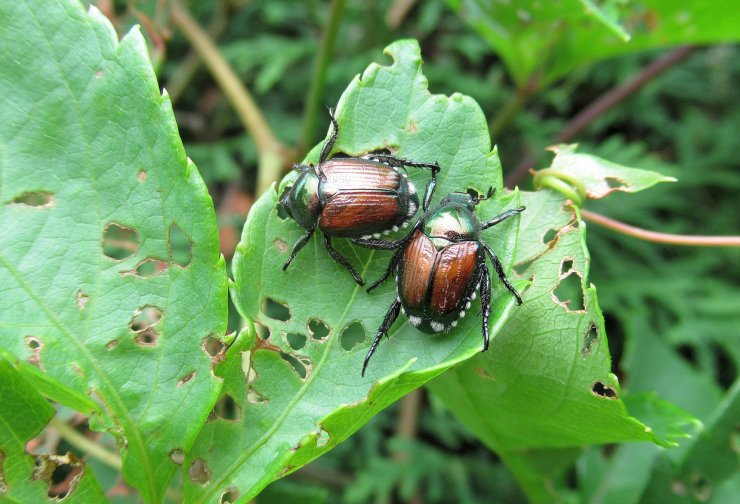
Natural Pest Resistance
Since we all hate those pesky chewing insects like aphids, whiteflies, and other hard-shelled plant bugs, you’ll be happy to know that worm castings are also a natural insecticide. They have a digestive enzyme called chitinase which kills these pests by dissolving their exoskeletons (…yep).
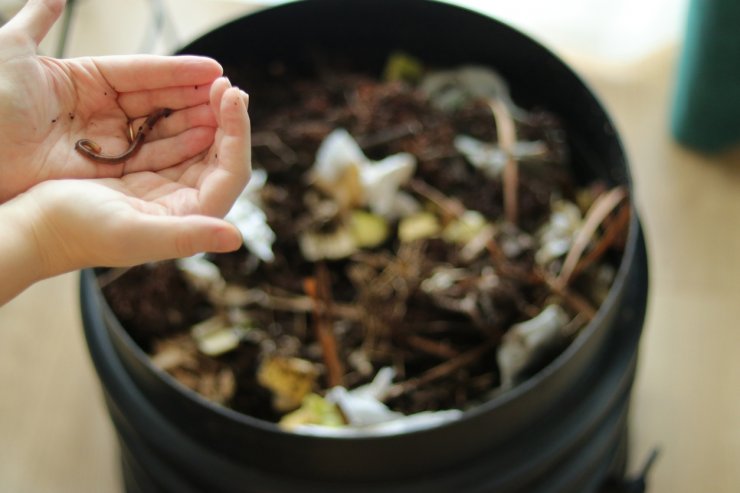
Cost-Effective (WIY: Worm It Yourself!)
You can purchase worm castings products at a garden store (one brand is called Worm Power). But are you daring enough to build your own worm composter? By creating your own worm composter, you’ll save money and be more sustainable by composting your green kitchen scraps.
They’re pretty simple to put together and there are plenty of guides out there to choose from. Some basic materials used to build your own worm casting bin:
- Plastic bin
- Garden soil
- Green ingredients (veggie scraps, eggshells, coffee grounds, grass clippings)
- Brown ingredients (newspaper, corrugated cardboard, dried leaves)
- Red wiggler worms
With the above items, you can create a simple worm composter quickly. Heck, you could make one this afternoon.
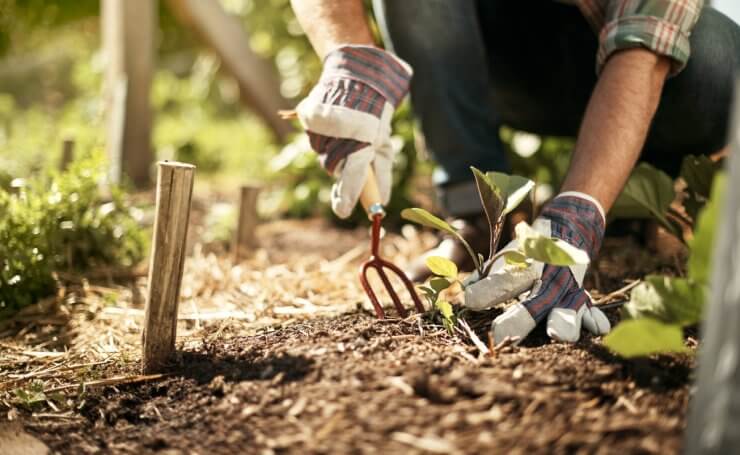
How do I use worm castings in my indoor plants?
Use worm castings in the same way as other types of fertilizer. Use ¼ cup of worm castings for every six-inch diameter of your container/pot. Or you can sprinkle a few tablespoons at the base of the stems and water thoroughly. Again, adding a little extra will not harm your plant (unlike chemical fertilizers).
Are you ready to try worm casting compost? I’d love to hear about your experiences using worm castings for indoor plants!
Discover 7 top tips for growing, harvesting, and enjoying tomatoes from your home garden—when you access the FREE guide The Best Way to Grow Tomatoes, right now!





We’ve been worm farming for about 10 years with excellent success. Then this year we were swamped by flies that had gotten inside and laid eggs. We are thinking of building sides to prevent fly access. Does anyone have other ideas/experience?
Arbico sells a solar fly trap as well as others. Great company for predatory bugs.
Yes the soldier fly invaded our worms. We made the best of it and fed the larve to the chickens.
When my momma passed away 8 yrs. Ago I took my mommas peace Lilly plant to my home and it was so big and beautiful the leaves were shiny and dark green. Over time it was getting what I thought was root bound, so I got another large pit and separated some of the plants, there was so many plants I was able to give away some, but since I’ve this they haven’t looked as beautiful. I know going to sound dumb to fikes but I had to move them to my carport because hoe big the pot was and they were doing good but not great like mommas green thumb.we bought all new soil and potting mix and added some the other of each to each pot. one pot is doing good the other looks pitiful,I’ve bought plant sticks food and inserted them in the plants. Haven’t seen any real improvement. What else can I do?
I have no worms in my raised beds but tons of red millipedes.
Are the millipedes bad for my garden?
They’re not bad to have in small amounts because they break down dead plant scraps, but infestations are bad because they will begin to feed on the good stuff.
Please get your facts straight. Do NOT use garden soil. Red wigglers are composting worms not earth worms. They live in decomposing plant and food waste, not soil.
The garden soil is for burying it in, not adding to it 🙂 You obviously don’t NEED to bury it, depending what you buy, but the one I use is directly in the soil.
The garden tower 2 has a bin in the middle for worms and compost. The bin has wholes in it which allows the worms to crawl in and out. I was fortunate to have a worm farm close, but they can also be purchased online at Uncle Jim’s Worm Farm.
Love that! It’s on my wishlist now!
Interested in buying red wiggles worms, where can I buy them, how much and info on raising them for my gardens
I suggest finding them locally. Your local farm or gardening store may be able to point you in the right direction. I don’t like the idea of buying online and accidentally introducing something new that could be a totally different species or invasive, but i have heard good things about Uncle Jims Worm Farm – https://unclejimswormfarm.com/
Can I just add worms to my potted plants and let them aerate the soil and leave castings in the soil?
You can certainly always add earthworms to soil, I’ve never done it indoors though!
I garden in a container
Life is only as hard as you make it
Spend the $15 or $20 for the 4 lb bag @ Home Depot or Ace and add it to your container mix once a year beats the H out of trying to compost & you end up with basically the same results